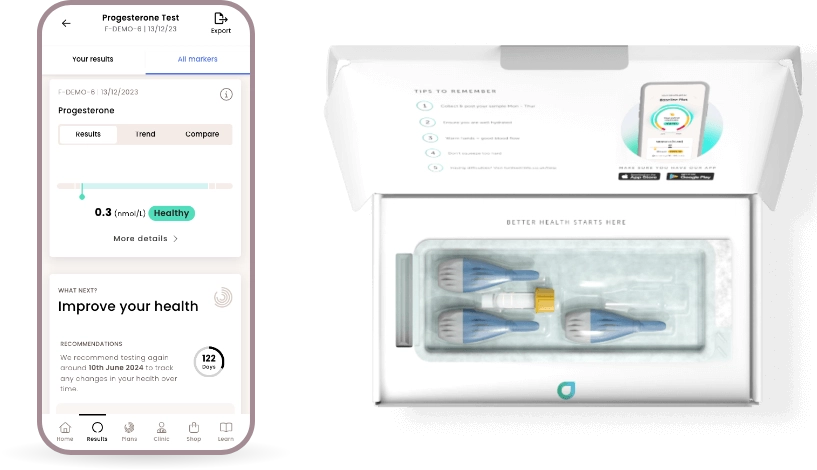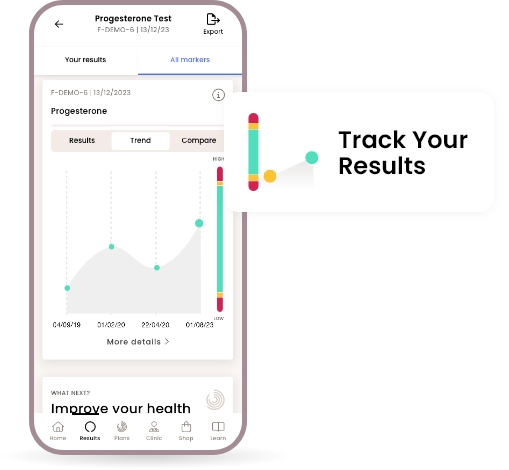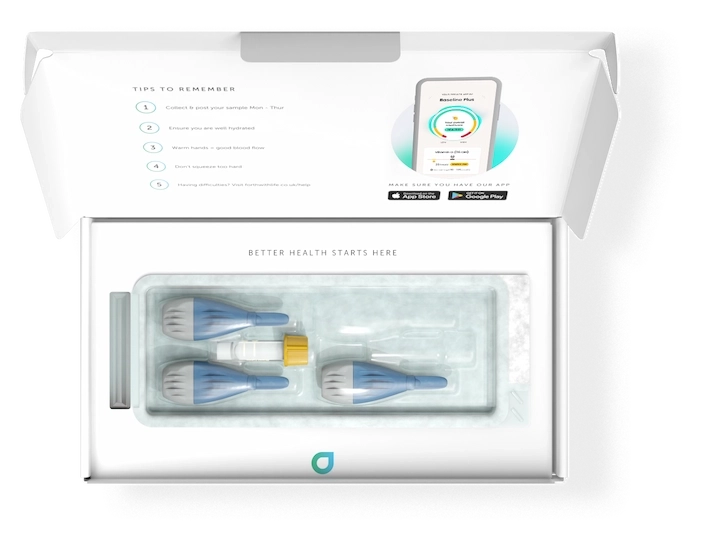About flexible subscriptions
How does a subscription work?
When you purchase this test subscription plan, we will automatically send you another test kit in a few months. Don't worry - you have full control over when this will be, and you can change/cancel it anytime.
When you first purchase this test, you can choose your subscription options in the checkout. We do this, because we recommend taking multiple tests over time to track how your biomarkers change. You'll be charged per test kit (rather than monthly, for example).
Why subscribe to multiple tests?
One test will show you what areas you need to focus on, continued testing will help you learn how your training, diet and lifestyle is impacting your health.
How often should I test?
We recommend a follow up test 3 months after your first test, followed by a test every 6 months depending on your results, but its up to you!
Can I change what's tested in future tests?
Yes, you can tailor/customise subsequent tests (via your app) to focus on just the areas that need improving.
Progesterone Blood Test
£44
Our progesterone blood test will confirm if you've ovulated and is taken on day 21 of your menstrual cycle. For a more complete picture of your hormone network, we recommend our advanced female hormone test, MyFORM®.
Validated & analysed by NHS Lab
Tracked 24 delivery
Finger prick or venous collection
Results in 2 working days
Shop now. Pay over time with Klarna
Klarna available at checkout.
Klarna's Pay in 3 / Pay in 30 days are unregulated credit agreements. Borrowing more than you can afford or paying late may negatively impact your financial status and ability to obtain credit. 18+, UK residents only. Subject to status. Ts&Cs and late fees apply.
What gets tested?
1 Biomarkers
Blood sample collection options
How does it work?
When do I take the test?
Collect your blood sample on day 21 of your menstrual cycle (day 1 being the first day of your period).
Certified for quality & security
Blood sample collection options
You can choose your preferred collection method when you checkout
Finger prick kit (FREE)
You can do this test at home without the need for a doctor. We'll send you everything you need to collect your sample and post it back to us. And it's all included in the cost. We've put together a video that covers the process, making it easy to check and track your health from home.
Home nurse appointment (+£60)
We'll arrange for a medical professional to visit your home and collect your sample. This is great if you're unsure on how it all works or have trouble collecting a sample. No need to book a doctor's appointment or visit a clinic, we'll send you everything you need to collect a sample and post it back to our labs.
Visit a partner clinic (+£45)
Once you've ordered your test, look out for an email from our phlebotomy partners containing information and a link to book your appointment. We'll send you everything the clinic will need to complete the sample and post it back to our labs.
Organise a nurse myself (FREE)
If none of the above options work for you, you can arrange your own medical professional to collect your sample. There is no additional charge for this. Once you've ordered your test, we'll send you everything you and your chosen medical professional will need to collect a sample and post it back to our labs.
Still unsure how it works? You can find more information on collection methods and the service we provide in our 'How it Works' section.
How does it work?

1. Choose your blood test
No need to wait for a GP appointment, your kit will arrive within 1-2 days, which includes everything you need to collect your blood sample and post it back to our labs.

2. Collect your sample
Take your finger prick blood sample at home, or choose to have your blood taken at a Superdrug health clinic or a nurse at home. Return to our NHS lab using our prepaid envelope.
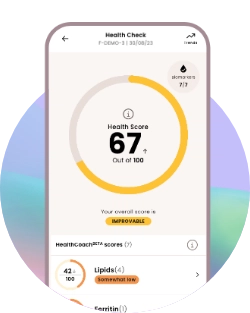
3. View your results
View your results on your secure health dashboard within 2 working days of our lab receiving your sample. Read personalised comments from our GPs.
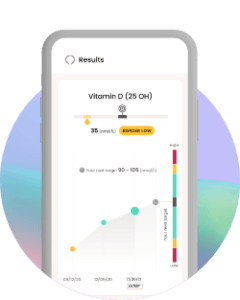
4. Make improvements
With more in-depth results, you will be able to identify areas that need improving. Make the changes and track your progress.
What gets tested?
1 Biomarker Included
Additional biomarkers can be added by personalising this test.
What are biomarkers?
Biomarkers are specific compounds we can detect in your blood sample that reflect different things about your health. Your test will tell you your levels for each of the above biomarkers, and whether they are in a normal range.
What does a progesterone blood test check?
Our progesterone blood test is useful for women who are trying to conceive and want to know if they are ovulating. For a more in-depth look at your hormones, we recommend MyFORM®, our ground-breaking female hormone mapping test that can tell you if you’ve ovulated in that cycle and help provide answers if not.
Why do a progesterone blood test?
A progesterone test can help if you’re trying to conceive or want to check your ovulation. Your progesterone levels are highest on day 21 of your menstrual cycle. If your levels are lower than expected, it can indicate you haven’t ovulated. However, for a more comprehensive look at how your hormones fluctuate, we recommend our MyFORM® Female Hormone Mapping test, which tests your hormone levels on day 14 and 21 of your cycle.

How to check progesterone levels at home
Our progesterone blood test is a day-21 test, meaning you have to collect your blood sample on day 21 of your menstrual cycle. The kit contains everything you’ll need to collect a small blood sample and post it to our labs for analysis. Your results will be looked at by our medical team, who will provide comments and advice on your progesterone levels.
Frequently asked questions
This is what our customers ask us most about this test. For more information, try our help centre.
What is progesterone?
Progesterone is one of 4 key female hormones. It is produced primarily in the ovaries, and is responsible for a host of functions, including the regulation of your menstrual cycle, supporting pregnancy, breast development, bone health and mood regulation.
Although progesterone is associated with the female reproductive system, small amounts are also produced in men, where it is involved in the production of other hormones, including testosterone and corticosteroids.
Synthetic forms of progesterone, called progestins, are often used in hormonal contraceptives and hormone replacement therapy to mimic the actions of progesterone in the body.
What are the symptoms of low progesterone?
Low progesterone levels can manifest with various symptoms, and these symptoms can overlap with other health conditions. Symptoms of low progesterone include[1]:
- Irregular Menstrual Cycles
- Heavy Menstrual Bleeding
- Premenstrual Syndrome (PMS)
- Difficulty Getting Pregnant
- Recurrent Miscarriages
- Low Libido
- Mood Swings and Anxiety
- Insomnia or Poor Sleep
- Fatigue
- Headaches or Migraines
[1]https://www.aspenmedicalpractice.nhs.uk/wp-content/uploads/2019/07/Symptoms-of-Early-Menopause.pdf
What can cause low progesterone?
Low progesterone levels in women can be caused by various factors, and it’s often a complex interplay of physiological and lifestyle elements. Common causes of low progesterone are:
- Anovulation
- Polycystic Ovary Syndrome (PCOS)
- Stress
- Excessive Exercise
- Underweight or Low Body Fat
- Perimenopause and Menopause
- Hypothyroidism
- Chronic Illness or Inflammatory Conditions
- Ovarian Cysts or Tumours
- Medications
- Endocrine Disruptors
How to treat low progesterone?
There are a few things you can do to increase your progesterone levels if they’re are outside of their optimal range:
Hormone Replacement Therapy (HRT): In some cases, your doctor may prescribe hormone replacement therapy. This can be administered in various forms, including pills, creams, or injections.
Lifestyle Changes: Maintaining a healthy lifestyle can help support hormonal balance. This includes getting regular exercise, managing stress levels, and getting enough sleep.
Diet: Certain foods may help support hormone balance. Foods rich in vitamin B6, zinc, and magnesium, such as nuts, seeds, and leafy green vegetables, may be beneficial. Enjoying an overall balanced diet can contribute to hormonal health.
Avoiding Endocrine Disruptors: Endocrine disruptors are substances that can interfere with hormone production and regulation. These may include certain chemicals found in plastics, pesticides, and some personal care products. Minimising exposure to these substances can be beneficial.
Identifying and Treating Underlying Conditions: Low progesterone levels can sometimes be a symptom of an underlying health issue. Identifying and addressing the root cause, such as polycystic ovary syndrome (PCOS) or thyroid disorders, may help improve hormonal balance.
What does progesterone do in the menstrual cycle?
The menstrual cycle can be split into two main phases – the follicular phase and luteal phase. During the luteal phase, progesterone prepares the body for pregnancy and supports early pregnancy. It helps thicken the uterine lining, creating a more hospitable environment for a fertilised egg to implant and supporting early embryonic development.
How can I increase my progesterone?
Making significant changes to your diet or lifestyle, especially if you suspect a hormonal imbalance, can help return your progesterone to optimal levels. Start by making sure you’re enjoying a balanced diet with healthy fats, limited processed foods and sugar.
Maintaining a healthy weight can also help keep your hormones working as they should be, making exercise a key component to your overall hormone health. Reducing stress and getting lots of sleep can also help.
If your levels are still low after these changes, speak to your doctor about what the next steps are that could help you.
How soon will the test arrive?
If you order your test before midday on a Monday to Friday then your kit will be dispatched
the same day.
All our kits are sent out via Royal Mail first class post, so it should be with you within 1-2
working days.
How secure is my data?
We have strict processes in place to ensure the protection of your data. Following GDPR the company also operates under tight legal rules about the sharing of data which ensures that data is only shared if it is crucial to the delivery of our service. For example, our doctors see customer results at the time of review, however, after review, access to results is withdrawn.
Learn more about your data security.
Can I have someone take my blood for me?
Yes. We offer two options if you do not want to do our finger prick test. The first is a home appointment where a nurse comes to your home to take a blood sample. The second is to visit a Phlebotomy clinic near you that offers a blood sample service.
A blood sample will be taken from your vein and we will provide you with everything you need to give to the nurse to allow them to take the sample.
The nurse will give you the blood sample to return to us using the pre-paid envelope provided.
Does a doctor review my results?
We have a team of doctors and nurses who look at all results and will comment on any results that are outside of the normal range for your age.
Can I download the results to share with my GP?
Yes, you can download your results from your health dashboard as a PDF to share with your GP.
Learn how to export your results.
We are dedicated to supporting you on improving your health
Go to help center
Progesterone Blood Test, recommended by our doctors
"A snapshot picture of your progesterone can help assess menstrual cycle regularity, ovulation, and pregnancy. This information aids in fertility planning, identifying hormonal imbalances, and addressing potential issues early, ensuring women can make informed decisions about their reproductive health and overall well-being but is best being used as part of a wider panel to assess your wider hormone network. "
Dr Thom Phillips
Similar tests
- Health scores calculated
Close
We're changing people's lives
How our Progesterone Blood Test works
Getting the insights you need to improve your health has never been easier.

1. Choose your blood test
No need to wait for a GP appointment, your kit will arrive within 1-2 days, which includes everything you need to collect your blood sample and post it back to our labs.

2. Collect your sample
Take your finger prick blood sample at home, or choose to have your blood taken at one of our partner clinics or a nurse at home. Return to our NHS lab using our prepaid envelope.

3. View your results
View your results on your secure health dashboard within 2 working days of our lab receiving your sample. Read personalised comments from our GPs.

4. Make improvements
With more in-depth results, you will be able to identify areas that need improving. Make the changes and track your progress.
What's included in this test?
1x Yellow Tube
3x Lancets

1x Cleansing wipes

Plasters

2x Alcohol swabs
1x Return pouch

1x Tracked 24 return envelope

1x Lab request form
Blood sample kit
Results within 2 working days
Tracked 24 delivery & return
Secure health dashboard
Accredited lab analysis
Doctor reviewed results
Our impact in numbers...
70+
From hormones to nutrients, we offer 70+ different tests
60,000+
We've helped over 60,000 people improve their health
800,000+
We've delivered over 800,000 test results
Related articles
Like this article? Here are some more based on similar topics.
Progesterone Blood Test

